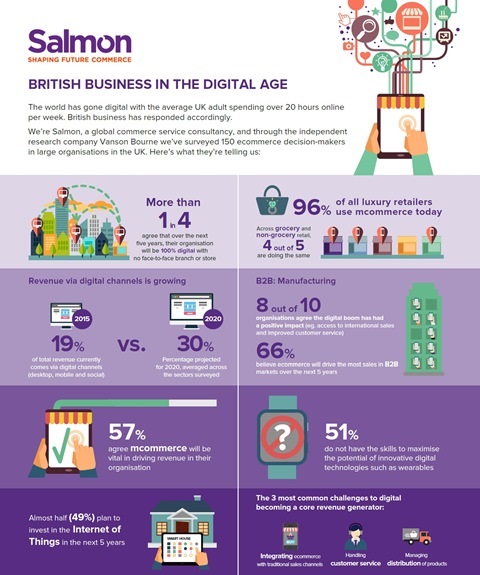Just 19% of total annual revenue comes from digital sales channels, but growth is expected as strategies mature and IoT and wearables rise up the agenda, according to a new report.
The study from global ecommerce consultancy Salmon analysed how companies across a range of sectors rate their performance in digital channels.
The findings reveal a business world striving to maximise the revenue potential of digital technology but struggling to make that a reality.
Despite UK businesses investing in digital commerce, with mcommerce (49%) and desktop ecommerce (81%) already key sales channels, only 19% of total annual revenue currently comes from digital commerce.
When asked to pinpoint the challenges faced in maximising the potential of digital commerce, respondents claimed the biggest battle for developing ecommerce as a whole (41%), and more specifically when it came to mcommerce (23%), was the issue of integration with traditional sales channels such as face-to-face and in-store.
Handling customer service (37%) and managing the distribution of products when selling to customers (35%) were also noted as challenges.
However, businesses need little convincing of the advantages of digital sales channels and in many cases are already experiencing them – 89% of luxury retailers with a mobile sales channel have experienced benefits as a result. Additionally, over two thirds (69%) of respondents highlighted the ability to collect customer data and target customers more accurately as key benefits.
Neil Stewart, CEO of Salmon commented: “Increased year-on-year spend, technologies providing the next cutting-edge development and improved customer engagement are all proof that UK business is certainly seizing this opportunity with both hands. But the ecommerce journey is not a smooth one for a number of organisations and this is hindering their potential across digital channels.”
Despite the revenue opportunities digital commerce brings, it is clear that businesses face challenges in turning benefits, such as improved brand awareness, into increased sales. The situation is not helped by lack of clear responsibility – 67% don’t have a dedicated team in place – or a plan to deal with the pace of change, with over half (51%) agreeing their organisation does not have the skills to maximise the potential of digital technologies.
Looking ahead, as digital technology continues to innovate and new services come into play, businesses are preparing to take advantage, with almost half of all organisations (49%) planning to invest in the Internet of Things (IoT) and wearables within the next five years.
“British businesses are certainly exploiting digital sales channels but the fact is that they can do more to realise their full potential,” added Stewart. “Rushing ahead with emerging digital technologies before mastering the basics is unlikely to reap the revenue returns we all hope for. Digital commerce has the potential to be as vital to UK plc – whether B2B or consumer-facing – as it is to the lives of the general public. Businesses need to think long and hard about the role digital commerce can play in their organisations and go on a journey to realising that potential, implementing strategies which suit the bespoke needs of their customers.”
The full study, entitled ‘British Business In The Digital Age’, is available for download here (registration required).
Analysis
Following the launch of Salmon’s new research, Rupal Karia, Managing Director Retail and Hospitality, UK & Ireland, Fujitsu, said: “The fact that only 19% of total annual revenue currently comes from digital commerce highlights how many retailers still need to take advantage of the benefits of digital technology, not just in the e-commerce space. There is a significant demand from customers for a more fluid shopping experience across all channels and it is clear that the physical store still has an important role to play.
“For many organisations, up until now digital channels were not a valid option due to costs and the requirements of a supporting supply chain. But we are now getting to a tipping point, highlighted by the recent Aldi move to online. It could be said that we are now approaching a step change for digital commerce.
“We are seeing how the retail landscape is rapidly evolving in line with changing customer demands, and giving the customer a choice when it comes to shopping will only become more apparent. Our recent study into the UK’s digital landscape – Digital Inside Out – found that one in four consumers always choose a digital option (when available) when it comes to retail, while online shopping and click and collect were the second and third most used digital services respectively. With this demand for both digital and face-to-face services, it’s more important than ever for retailers to create a balanced, efficient offering that caters for all customers.”
Juha Mattsson, CMO at Walkbase, added: “We are certainly seeing the impact of digital services in the retail industry and as this research highlights, there is more to be done. It is clear that the physical store is still an important part of the shopping experience in retail, as we continue to see significant demand from customers for a blend of both digital and face-to-face services. Shoppers are now demanding the same level of customer experience and convenience across all channels – online, in-store and mobile – and this trend will continue to grow. This means we as shoppers want things like quick access to product info, location triggered recommendations and personal discounts to be at hand regardless of where they choose to shop.
“It is those retailers who are able to create a fluent path between online, in-store and mobile who will be most successful. If consumers are able to start their purchase path in one place and continue seamlessly in other, this creates the ease that they’re looking for. It has never been more important for retailers to keep the customer at the heart of the shopping experience, creating a balanced, efficient offering that caters to all customers.”
